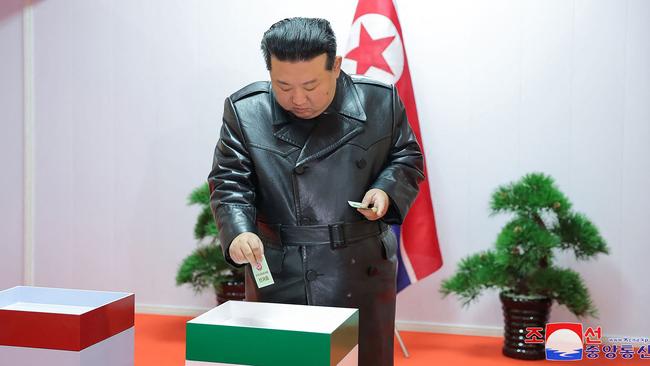Kim takes liberal approach, allows 0.1 per cent of voters to dissent
Results were still decisive, but the mere fact that North Korea has acknowledged the existence of an opposition is remarkable.

It is a political earthquake that has provoked speculation about the future of one of the most closed and repressive countries in the world and thrown experts into confusion. In North Korea, the last of the totalitarian communist dictatorships, an election has been held in which ruling party candidates did not win 100 per cent of the votes.
North Korea has long held so-called elections in which members of the Workers’ Party of Korea stand unopposed and are obediently chosen by every single voter. But in polling held over the weekend for local assemblies, the previously unthinkable happened: according to state media a small proportion of voters rejected the nominated candidates.
“Among the voters who took part in the ballot-casting, 99.91 per cent voted for the candidates for deputies to provincial people’s assemblies and 0.09 per cent voted against them,” the Korean Central News Agency reported. In voting for city and county assemblies, the rate of dissent was even higher at 0.13 per cent. Clearly, these were still decisive results, but the mere fact that North Korea has acknowledged the existence of an opposition is remarkable. It was the first time since the 1950s that the state media had reported the existence of electoral dissent.
KCNA also reported a drop in voter turnout, from 99.98 per cent to 99.63 per cent – also notable in a country in which voting is mandatory. North Korea has a population of 26 million, so even a fraction of a percentage point of the electorate amounts to more than 10,000 people.
“They always used to say that no one voted against the candidate suggested by the party,” Fyodor Tertitskiy, a historian of North Korea at Kookmin University in Seoul, said. “The idea that the Workers’ Party of Korea, under the ‘great leadership of Comrade Kim Jong-un’, should nominate a person, and some people would say, ‘No, I don’t like that guy’ – that’s quite something.”
It is all the more remarkable because North Korean polling booths provide no secrecy. Voters must drop their ballot paper in a green box approving the single candidate, or a red one for rejecting them, making it immediately obvious how someone has voted.
No one is predicting any serious changes to the political arrangement in North Korea, where Kim, supported by his powerful sister, Kim Yo-jong, has unchallenged authority.
But reporting of the election seems to indicate a concern about how North Korea is perceived. This year the law was changed to allow for the possibility of multiple candidates competing for a seat, and of “primaries” in which a candidate would be chosen from several individuals. There are no indications, however, that any were held.
“They’re trying to demonstrate that dissent is tolerable, that this is more like an authoritarian than totalitarian state,” Mr Tertitskiy said.
The state media showed images of Kim voting in the election on Sunday at a polling station in South Hamgyong province.
He met candidates and urged them to be “genuine representatives and true servants for the people who strive to defend and realise their rights, interests and requirements”.
Meanwhile, the media continues to celebrate the spy satellite successfully launched by North Korea last week in violation of UN resolutions. KCNA reported that Kim had been scrutinising images of the White House and the Pentagon as well as US and British aircraft carriers.
The media has not shown the satellite images, possibly because, as South Korean intelligence believes, they are of low quality.
THE TIMES



To join the conversation, please log in. Don't have an account? Register
Join the conversation, you are commenting as Logout